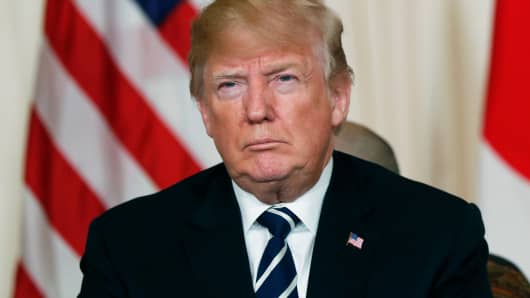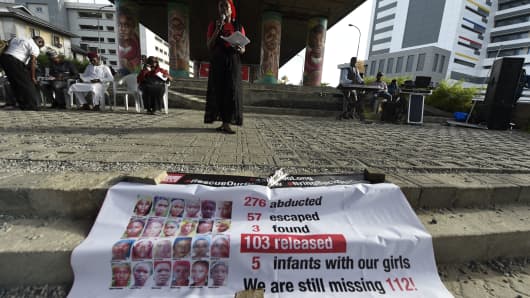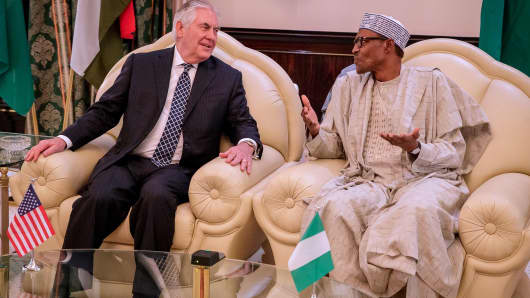
https://www.cnbc.com/2018/04/30/trump-white-house-to-host-nigeria-president-buhari.html
- President Donald Trump is hosting Nigerian President Muhammadu Buhari at the White House Monday.
- The event will mark Trump's first official visit from an African head of state.
- Last April, the Trump administration tied up a $600 million deal with Nigeria over the sale of military aircraft intended to be used in the fight against Islamic extremist group Boko Haram.
President Donald Trump is hosting Nigerian President Muhammadu Buhari at the White House Monday in what will be his first official visit from an African head of state.
The "struggle against Islamic terrorism
in the Sahel," an area to the far north of Nigeria, as well as a "White
House attempt to make nice to Africa after a series of false steps,"
could be part of the agenda, John Campbell, U.S. ambassador to Nigeria
from 2004 to 2007 and now a senior fellow at the Council on Foreign
Relations, told CNBC last week. Campbell emphasized that his suggestions
were just "speculation" and that he has no connection with the present
U.S. administration.
In January of this year
Trump is alleged to have referred to African nations as "s---hole
countries," which the White House later did not deny.
The invite to Buhari was issued earlier this month,
with the intention for both leaders to discuss promoting economic
growth, fighting terrorism and "building on Nigeria's role as a
democratic leader in the region," a White House communique said.
Nigeria has seen its economy hammered in recent years by the volatile oil price, plunging into its first annual recession in 25 years in 2016. Gross domestic product growth for 2018 is forecast to be 2.1 percent by the International Monetary Fund.
Nonetheless, Nigeria competes with South Africa for the title of the largest economy in sub-Saharan Africa and is the continent's most populous nation, with 200 million inhabitants.
Last April, the Trump administration tied up a $600 million deal with Nigeria over the sale of military aircraft intended to be used in the fight against Islamic extremist group Boko Haram. The deal dates back to former President Barack Obama's tenure, but was delayed over human rights concerns.
Nigeria has seen its economy hammered in recent years by the volatile oil price, plunging into its first annual recession in 25 years in 2016. Gross domestic product growth for 2018 is forecast to be 2.1 percent by the International Monetary Fund.
Nonetheless, Nigeria competes with South Africa for the title of the largest economy in sub-Saharan Africa and is the continent's most populous nation, with 200 million inhabitants.
Last April, the Trump administration tied up a $600 million deal with Nigeria over the sale of military aircraft intended to be used in the fight against Islamic extremist group Boko Haram. The deal dates back to former President Barack Obama's tenure, but was delayed over human rights concerns.
Nigeria imports most from China, whose share of total imports accounts for more than double that of the U.S., according to the World Bank.
Buhari's last foreign visit was to London for the Commonwealth Heads of Government Meeting last week, at which he said he'd met with Shell for talks to help secure a potential $15 billion investment in his country.
Buhari, 75, is a former
military leader. He was elected president in 2015 in what signified the
first time an opposition party had won an election in Nigeria. Earlier
this month it was announced that Buhari would contest the presidency
once again when Nigeria heads to the polls next year.
"For Buhari it is
advantageous to be seen to be active at the highest world stage while
his campaign for re-election in 2019 builds steam," Philip Walker,
Nigeria analyst at the Economist Intelligence Unit, told CNBC.


No comments:
Post a Comment